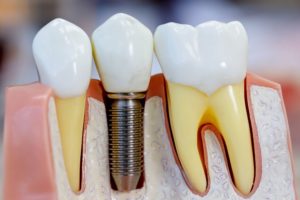A dental implant is one of the strongest, most effective options for tooth replacement available today. Best of all, it looks real and functions just like your natural teeth. If you have a missing tooth or need to have a tooth extracted, don’t wait to get that implant. It takes time to replace a missing tooth with a dental implant, but once it’s finished, you’ll be grateful that you did it.
Patients who are planning to have a dental implant should be aware of the multiple steps ahead of time. The entire process includes a few appointments with some healing time between each before you get your final tooth.
Generally, here are the steps involved in a dental implant procedure.
1. Screening and Consultation
During this period of time, we will examine your mouth and jaw, and take the appropriate x-rays and measurements to determine if you are a good candidate for dental implants. We want to place dental implants in healthy jawbone. The goal of this step is to determine the quality and quantity of bone available for implant placement. If there is adequate bone the surgery date will be set. If there is not enough bone we may discuss the need to add bone with a bone graft. We will also determine the need for any 3D imaging to assist in any guided surgery.
2. Tooth Extraction and Bone Grafting
We will extract the sick tooth, as well as place bone graft material in the area if required to contribute to proper healing and maintain the volume of bone. This will prepare the site for future implant placement.
If the situation calls for it many times a dental implant can be placed the same day as the extraction. That is called an immediate implant. It reduces some of the healing time necessary before placement of your final crown.
We will provide you with care tips for the day of and the days following the extraction. Initial healing after an extraction takes about a week or two. It takes more time for the area to heal to accept a dental implant. Most implants are ready to receive their final crown 3-6 months after placement of the dental implant.
3. Implant Procedure
If we are replacing a missing tooth, after getting you numb we will make a small incision in the gums to access the bone. We will place the implant into the area where the tooth root should be, and seal the gum over the implant allowing the bone to fuse to the implant. The implant itself is like an artificial root for a tooth. It looks like a titanium screw. The bone will heal and be strong enough to place a crown on top in 3-6 months time.

4. Making the Crown
After the appropriate healing time, typically 3-6 months the implant is ready to be fitted for the final crown. If the implant is under the gums we will get you numb and expose it to the oral cavity. Special impression copings will be attached to the implant and a putty or digital mold of the impression will be taken.
This information will be sent to the dental laboratory where your final crown will be made.
5. Crown Placement
A few weeks later you will return for your final visit. Quick and easy, no numbing. The final crown is fit and adjusted. At this point it is yours to enjoy. Brush just as you would your natural teeth and off you go to smile and enjoy your next meal.
While the entire process can take several months depending on your healing, the end result is well worth it. You will have a new tooth that functions just like your natural teeth and can last indefinitely.
If you have missing teeth and are considering getting an implant, it’s important to do so as soon as possible. Bone is lost over time after it no longer has a tooth to support. Studies show we lose up to 60% of our dental ridge shortly after a tooth is lost. If you lose too much bone dental implants may not be an option for you without extensive bone grafting. A missing tooth may cause your teeth to shift and lead to the wearing away of bone in the area. When this happens, your cheek no longer has a stable structure, causing sagging of your cheek at the lower jawbone area or a caved-in appearance under your cheekbone, depending on where the gap is located.
For more information about dental implant procedures, visit our website or call our office. To schedule a consultation for a dental implant or tooth extraction, call to make an appointment with Dr. Fienman.



